The Slants and That Washington Football Team: Why “offensive” trademarks matter
As 2015 came to a close, the US Court of Appeals handed down a major ruling, that the US Patent and Trademark Office (PTO) can no longer deny registration to disparaging or offensive trademarks due to the Constitution’s free speech provisions.
The ruling recognized that what people name their company or products may be both commercial and personal speech at once. As companies strive to be more personal and have greater meaning in their customer’s lives, culture and business are increasingly intermixed. This is a cultural shift that has taken place gradually in our lives, may change business law in unexpected ways.
Nowhere is this more evident than in the entertainment industry where personal and commercial identity have always been intertwined. Remember Prince’s 1993 falling-out with Warner Brothers during which he only appeared in public with the word “slave” written on his cheek. And that he then abandoned his stage name for a symbol? The line between brilliance and freakishness is gossamer-thin, and the byzantine world of trademark law has fanned this through processes that challenge rationality.
Meet the Slants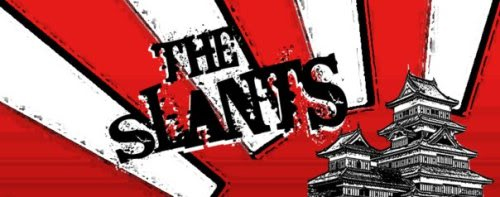
The ruling, which many expect to head to the Supreme Court, centers on the Portland, Oregon dance band – The Slants.
From Wikipedia:
The band was founded by Simon Young (also known as Simon Tam) in 2006 in Portland, Oregon. Often compared with 80’s synth-pop bands such as Depeche Mode, New Order, and Joy Division, as well as modern acts such as The Killers and The Bravery, the band often refers to their sound as “Chinatown Dance Rock.” All five members of the current lineup are of Asian Pacific Islander descent and they are well known for their involvement with the Asian American community, often playing at large cultural festivals and anime conventions, and fighting racist ideas/stereotypes.
As should be obvious The Slants’ name was chosen because it was a racist slur and because the name has a very different connotation if used by people of Asian/Pacific Islander descent. The band and its name have already scored some major points among some very unlikely people. Tam detailed one of these which took place when the band played at the Oregon State Penitentiary (and major kudos to whoever made this concert happen):
At the end of the concert, a small group of shirtless white men approached the police tape. Several of them were completely covered in swastikas and white pride tattoos. A large man in front came up, towering over me. He seemed nervous as he handed me a piece of paper and asked for an autograph.
“It’s for my daughter,” he said. “I want to tell her that I met the band.”
He went on: “I know I have these tattoos, and I know what you must be thinking. I’ve made a lot of mistakes in my life, and they’re mistakes that I don’t want my little girl to make.” He said he wanted to show that he could learn, that he could change his heart and mind even if he couldn’t change what was stained into his skin.
I get chills just reading that so it’s no wonder Tam called the concert, “One of the most powerful experiences of my life. I went in with all kinds of assumptions, but those changed when we talked with the prisoners.” It would not have taken place had the band’s name been other than what it is.
The story, from Tam’s account of the band’s quest to register its trademark, shows why the First Amendment’s protection of speech is so important. The rest of Tam’s story shows why those protections can’t be managed by bureaucratic regulation. The PTO refused the trademark registration based on section 2a of the Lanham Act which prohibits scandalous, immoral or disparaging names from being registered. While on the surface this may seem a fairly straightforward rule it begs the question, who gets to decide what is “scandalous, immoral or disparaging”?
Laudable but without influence
Tam pursued his appeal to the PTO, in which he explained his choice of this name:
I named the band the Slants because it represented our perspective—or slant—on life as people of color. It was a deliberate act of claiming an identity as well as a nod to Asian American activists who had been using the term for decades. I’ve supplied thousands of pages of evidence, including letters of support from community leaders and Asian American organizations, independent national surveys, and an etymology report from one of the country’s leading linguistics professors. The trademark office was not swayed. They called our effort “laudable, but not influential.”
The PTO’s ruling on the other hand was not laudable, but it was influential. It illuminated the senseless and capricious way in which these decisions are made. How capricious? In the course of their appeals, The Slants found the PTO had received over 800 applications for marks containing the word “slant.” All of them were approved, except for theirs. Trademark officials admitted they considered the term to be racially charged because it was used by Asian performers, and in the context of a website with Asian design elements.
In other words, The Slants were too Asian to register this mark, though it would be conceivably available to other non-Asian applicants. As their lawyer, Ron Coleman asked, how many Asian band members would they have to fire before this name would be considered non-offensive to that community? Since when do we deny trademarks based on the race of applicants? Exactly how offensive and racist is that?
The Devil Doesn’t Offend Democrats
Unlike legal proceedings, the rulings by the PTO are often made without precedent – so previous decisions may not dictate future ones. That’s how the trademark application for “HAVE YOU HEARD SATAN IS A REPUBLICAN?” was denied while “THE DEVIL IS A DEMOCRAT” was granted.
These and other rulings show that the definition of “scandalous, immoral or disparaging” is at best mercurial, depending on the political or cultural winds or the inclinations of whoever is making the decision that day. (Side note: While this is a terrible way to manage things it has resulted in some moments of unintentional hilarity. In seeking a trademark registration lawyers for the all-female Colorado band/comedy performance troupe “Harpoontang” wound up submitting a 47 page legal document discussing the cultural acceptability of a compound word incorporating the words “harp”, “harpoon,” “poon” and “poontang.”) Friends, there has to be a better use for legal thinking.
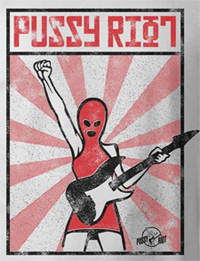 Trademarks Are Personally Valuable
Trademarks Are Personally Valuable
“The Slants” would have enjoyed some minimal protection of their name even without registration. After all, America makes commercial use the starting point for enforcing a mark. They could already claim some protection locally from other bands using confusingly similar names.
So, to be clear The Slants didn’t suffer the commission of censorship, but rather the omission of protection that would have been given to a mark acceptable to the PTO. But with this omission comes losses. Registration allows holders to define broader claims of rights across an array of product areas. Though the feminist punk protest group, Pussy Riot, is counter cultural and non-commercialist – they would have benefited from registering their name which would have allowed them more as supporters others began producing and selling shirts on their behalf. So though first use conveys some rights, that is reduced from those afforded through international treaties.
The Washington Football Team Conundrum
All this brings us to the issue of the NFL team which Wall Street Journal columnist Jason Gay calls, “The Washington Sadness Machine.” He refers to them this way for two reasons. One is that they are a terrible football team and have been for quite a while. The other is so he doesn’t have to use the team’s actual name which is a racist slur.
Many people (myself included) rejoiced when the PTO, citing the Lanham Act, revoked the team’s trademark registration. Hurrah, we said, this will end the embarrassment of having a team called The Racial Slurs in our nation’s capital. We said this in honest ignorance of all that that legally implied.
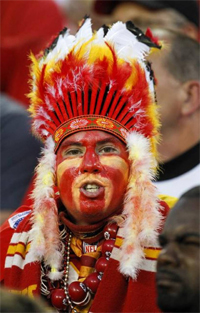 The team’s ownership made it easy to say hurrah. They had trotted out one nonsensical argument after another to justify the use of the name. All of them seem to be based in the entirely false idea that the team was named at a moment in time when this particular slur against Native Americans was not a slur at all. The team name after all is an ethnically framed statement of skin color as identity. Unless you’re Snow White – being known by skin color is not ennobling.
The team’s ownership made it easy to say hurrah. They had trotted out one nonsensical argument after another to justify the use of the name. All of them seem to be based in the entirely false idea that the team was named at a moment in time when this particular slur against Native Americans was not a slur at all. The team name after all is an ethnically framed statement of skin color as identity. Unless you’re Snow White – being known by skin color is not ennobling.
Stripping native people of lives and rights secured by treaty, but protecting them from possibly offensive trademarks is an irony not lost on me. As it happens, I was raised with Cherokee heritage, and have come to believe the US government’s actions have generally represented the general will of its people. That’s how democracy works. While there have been notable exceptions – numerous churches opposed the death march known today as The Trail of Tears and provided aid to Native Americans along the way, in general American’s have seemed more fond of Native Americans as icons and legends than neighbors. I’m don’t know any positive slang or nicknames for them, including the name of Washington’s football team.
The team’s ownership used the fatuous Once Upon A Time It Was Fine argument because they knew the only other defense – “Hey! The First Amendment applies to us, too!” – would require admitting that this was always a racial slur, and that addressing wasn’t worth the bother, unless it becomes bothersome.
Fix Racism in the Open
The NFL enjoys privileges from Congress and other public bodies. An exemption from anti-trust law, and playing in publicly subsidized stadiums come to mind. The anti-trust exemption is what allows the NFL to set player salaries, trade employees and structure their business as a legal sports cartel. Elected representatives could reconsider this special exemption, which is after all based on the idea that sport holds a special place in our culture. If those who run the league ruin their goodwill, it is entirely rational that Congress might rescind privileges. That’s how democracy works too. The Washington team’s name can be fixed out in the open, and done without mangling speech or trademark law.
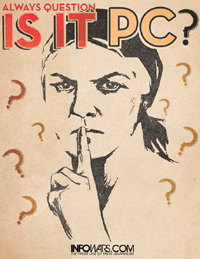 The PTO should never have been given the power to decide what is or isn’t scandalous or derogatory. No doubt the Lanham Act was written and passed with the best of intentions. People did not want others to derive profit from saying horrible things about persecuted groups. (I suppose some Presidential campaigns are doing this today. Back in 2000, one of today’s GOP leaders paid for ads suggesting Native Americans would be poor and criminal neighbors.)
The PTO should never have been given the power to decide what is or isn’t scandalous or derogatory. No doubt the Lanham Act was written and passed with the best of intentions. People did not want others to derive profit from saying horrible things about persecuted groups. (I suppose some Presidential campaigns are doing this today. Back in 2000, one of today’s GOP leaders paid for ads suggesting Native Americans would be poor and criminal neighbors.)
For the First Amendment to mean anything it must be applied equally to all; especially those saying disagreeable things. It is only by protecting their rights that we can keep our own. And to benefit from those like The Slants who invest themselves in to a project with a daring name, to expect it won’t be stolen or appropriated by others.
Roger Williams Got This Party Started
We might take some inspiration from Roger Williams, the founder of Rhode Island, a devout Christian and the man who created the separation of church and state. In 1644 he wrote a booklet entitled The Bloudy Tenent of Persecution, for Cause of Conscience. It was deemed so scandalous, immoral and disparaging that the British government burned every copy it could find. What did he say that was so terrible? “Enforced uniformity confounds civil and religious liberty and denies the principles of Christianity and civility. No man shall be required to worship or maintain a worship against his will.”
“Enforced uniformity confounds civil and religious liberty.” That applies to all your opinions and the words used to voice them. The Federal appeals court’s year-end ruling aligns to this, recognizing work and personal lives may grow from a shared root of meaning. Your words may denigrate, or challenge denigration. They may be used simply for profit, notoriety, or to inspire. By right, they’re your words.
This ruling puts commerce and conscience on something close to level ground, rather than the slanted playing field where examiners decide which words may be protected, and for whom.

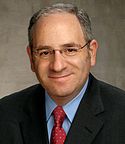
 The future of digital experiences will be built by strategists who grasp the full array of emerging business, social, and technical models. Specialties in user experience, branding, application design, and data science are laying the foundation for richer user experiences and business models breakthrough products and revenue based marketing.
The future of digital experiences will be built by strategists who grasp the full array of emerging business, social, and technical models. Specialties in user experience, branding, application design, and data science are laying the foundation for richer user experiences and business models breakthrough products and revenue based marketing.
17 Responses to "The Slants and That Washington Football Team: Why “offensive” trademarks matter"
June 20, 2017
[…] you to the tiny band of bloggers and commentators outside trademark law who understood why this case was bigger than trademarks or even, believe it or […]
July 4, 2018
I often visit your website and have noticed that you don’t update it often. More frequent updates will give your site higher rank & authority in google.
I know that writing posts takes a lot of time, but you can always help yourself with miftolo’s tools which will
shorten the time of creating an article to a couple of seconds.
October 2, 2018
I Personally Like Your Post, You Have Shared Good Article. It Will Help Me In Great Deal.
October 3, 2018
Thanx For Sharing Such Useful Post Keep It Up 🙂
November 26, 2020
Spend your quality time chatting with Cairnes Sex for free! Make sexual contact and enjoy for a long time!
March 11, 2021
tranny darwin is web place where nice local girls from Australia waiting for chat with you
April 8, 2021
adult personals uk is great web platform for sexy chat contacts in UK, check out and enjoy
May 20, 2021
Bradford sex chat is one of the most popular web platform for casual chat with local ladies in UK
June 3, 2021
Find some fine Brithish wifes ready for free chat contacts with you at British Housewives
July 3, 2021
Thank you for writing this post. I really enjoyed it. https://www.guttercleaninghobart.org/
February 23, 2022
Love this article, well writen. I enjoyed reading it.
May 4, 2022
sie sucht ihn sex dortmund is the best web place to have online sex chat with local girls online in Germany
May 11, 2022
Learnalanguage
May 17, 2022
Learnalanguage
October 31, 2022
Transexuel Rennes is fine web place for casual sexy chat contacts with hot ladies in France
February 16, 2023
Find fine ladies for casual chat contacts in France only at Lyon sexe
March 15, 2023
I need to tell you something about fine ladies in EU so you must check Sextreffen in Schaffhausen